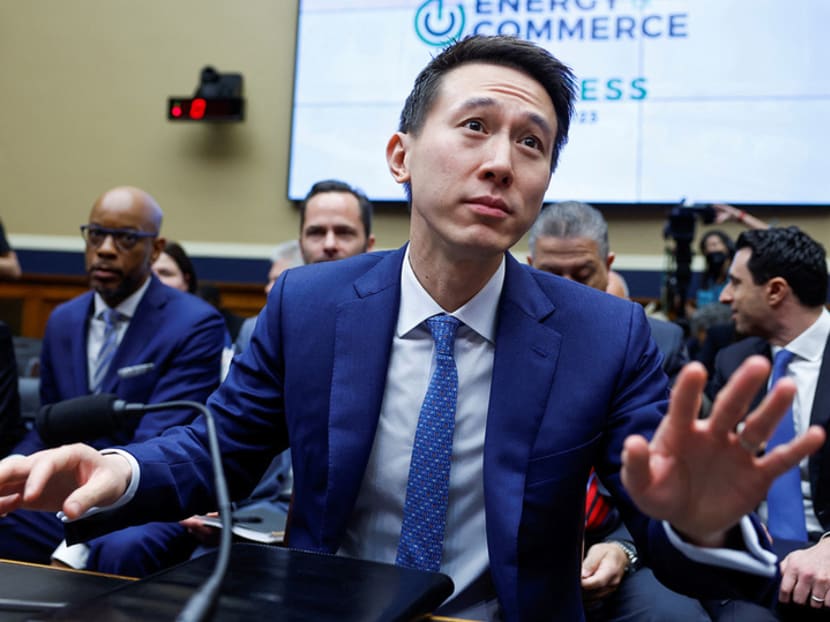Explainer: What now for TikTok in the US after CEO Chew Shou Zi's 5-hour grilling by US Congress?
SINGAPORE — With a five-hour grilling of TikTok chief executive officer Chew Shou Zi by the United States Congress now over, questions arise about what lies ahead for the social media giant, which is owned by Chinese company ByteDance.

TikTok chief executive Chew Shou Zi testifying before United States Congress on March 23, 2023.
- The future of TikTok in the United States is now being debated after TikTok CEO Chew Shou Zi gave five hours of testimony before US Congress
- The US legislators questioning Mr Chew were concerned that data gathered by the app could end up in the hands of the Chinese government
- But commentators said that Mr Chew's answers did little to assuage US concerns that the Chinese app poses a national security risk
- Options such as a forced sale of the stake in TikTok held by its Chinese parent company ByteDance are being mulled
SINGAPORE — With a five-hour grilling of TikTok chief executive officer Chew Shou Zi by the United States Congress now over, questions arise about what lies ahead for the social media giant, which is owned by Chinese company ByteDance.
US legislators are now mulling a nationwide ban on the platform, after US officials barred the app on government-owned devices and the Senate introduced a bill, which appears to have bipartisan backing.
The bill, if passed into law, would empower lawmakers to block the app, which is used by up to 150 million Americans.
The Biden administration also recently demanded that ByteDance divest itself of its stake in the video app, though it is unclear how the US government would implement such a move.
In any case, Mr Chew’s answers before Congress on Thursday (March 23) appeared to do little to assuage US concerns that the Chinese app poses a national security risk.
The 40-year-old Singaporean, who took over the helm at the popular video platform in 2021, repeatedly denied claims that the app shares data or has connections with the Chinese Communist Party.
Mr Chew argued that the platform was doing everything it could to ensure safety and security for its American users.
But US politicians did not offer any support for TikTok and they called Mr Chew’s answers on China “evasive”.
Since the hearing ended, some pundits have called Mr Chew’s appearance in Congress a “disaster” and likely to "set the stage" for a ban.
WHY TIKTOK IS UNDER FIRE
As the app is owned by China-based parent company ByteDance, US politicians are concerned that TikTok user data could end up in the hands of the Chinese government.
This is because Chinese companies are subject to Chinese data request laws that compel them to hand over information to the authorities about customers when they are asked to do so.
Against a backdrop of deteriorating relations between Beijing and Washington over issues such as Taiwan, US authorities are now calling for ByteDance to give up ownership of its US assets or face a ban.
Mr Chew was called to testify before US Congress on what the company is doing to protect US customer data, among other issues.
But even after more than five hours of grilling, it was clear US lawmakers were far from reassured.
HOW THE CEO FARED UNDER PRESSURE
BBC reporter James Clayton said that too much of Mr Chew’s testimony was “spent on the back foot” as his responses lacked any kind of “meaningful counter punch”.
“Legislators will feel emboldened after this. There is clearly a huge caucus of US politicians that are not satisfied with TikTok, and weren’t thrilled by his answers today,” said Mr Clayton.
“Legislators will feel emboldened after this. There is clearly a huge caucus of US politicians that are not satisfied with TikTok, and weren’t thrilled by his answers today.BBC reporter James Clayton”
Mr Dan Ives, managing director of New York-based Wedbush Securities, told AP news that Mr Chew’s testimony was always going to be fraught.
But his lack of concrete answers about data access and security was “a disaster” and would likely set the stage for a ban, said Mr Ives.
Agreeing, social media analyst at Insider Intelligence Jasmine Enberg told AP news that Mr Chew’s emphasis on TikTok’s reach in the US might have “strengthened US lawmakers’ argument that TikTok poses a threat to both national security and young people”.
Mr Chew had said repeatedly that TikTok has 150 million monthly active users in the United States.
WHAT’S NEXT FOR TIKTOK?
Following Mr Chew’s appearance before Congress, the future of TikTok in the US remains uncertain.
US politicians are demanding that TikTok's Chinese owners sell the social media platform, or risk facing a ban.
But if US bans TikTok, it is uncertain how the mechanics would work due to the involvement of US firms providing some of the services associated with the app.
Ms Shannon Reaves, a partner in Stroock’s Committee on Foreign Investment in the US compliance group, told news outlet CNBC that the government may have to turn to legislation or executive orders to get app distributors, internet service providers and cloud services to block access to TikTok.
Moreover, Tiktok users, who tend to be younger, will not be happy with any such ban.
A poll by the Washington Post found that more young Americans aged 18 to 34 opposed the ban rather than supported it.
The other option — a forced sale to the US — involves ByteDance giving up ownership of its US assets, thereby cutting off any Chinese ownership of the app.
It would be a complex step that requires unwinding a years-old transaction, CNBC reported.
However, this is unlikely to happen with the Chinese government announcing Thursday that it would “resolutely oppose” such a step.
Ms Shu Jiting, a spokeswoman for the Chinese Ministry of Commerce, said that a forced sale would “seriously damage investors from multiple countries including China” and “hurt confidence to invest in the United States”.
Previous efforts to achieve such an outcome were met with failure.
Then-President Donald Trump tried to force ByteDance to sell TikTok’s American business to a domestic firm in 2020, but a judge ruled against the measure, saying that Mr Trump had “overstepped his authority”.
During Mr Chew’s testimony before Congress, he also spoke repeatedly about a policy called "Project Texas", which will store all US data with American software company Oracle.
Costing at least US$1.5 billion (S$2 billion), Mr Chew hopes to have all of the data transferred by the end of the year.
For now, he confirmed that ByteDance engineers in China still have access to TikTok data.
This admission was picked up by politicians and they argued that if data can be accessed by engineers in China, the Chinese government could also access it.
Moreover, several lawmakers questioned if the timeline is possible, since millions of lines of source code would require review in a short amount of time.
“I am concerned that what you’re proposing with Project Texas just doesn’t have the technical capability of providing us the assurances that we need,” said California Republican Jay Obernolte.











